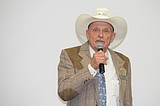New rate class discussed at PUD meeting
CHERYL SCHWEIZER | Hagadone News Network | UPDATED 6 years, 10 months AGO
Senior Reporter Cheryl Schweizer is a journalist with more than 30 years of experience serving small communities in the Pacific Northwest. She began her post-high-school education at Treasure Valley Community College and enerned her journalism degree at Oregon State University. After working for multiple publications, she has settled down at the Columbia Basin Herald and has been a staple of the newsroom for more than a decade. Schweizer’s dedication to her communities and profession has earned her the nickname “The Baroness of Bylines.” She covers a variety of beats including health, business and various municipalities. | August 15, 2018 3:00 AM
EPHRATA — Qualifying existing customers would be phased into a new Grant County PUD “evolving industries” rate class over a period of three years, if commissioners follow the recommendation of PUD staff. A review of the options was part of the regular commission meeting Tuesday.
The proposed Class 17 grew out a flood of requests for service, dating back to summer 2017. Many were from people involved in cryptocurrency, which uses a still-evolving technology known as blockchain to process non-monetary transactions. It became a focus of study because the process uses a lot of electricity, and the customer requests added up to about 200 megawatts.
The proposed rates were announced in June. Cryptocurrency – which is the only business qualifying for Class 17 currently – can be a commercial operation or set up in a residential area. Under the current proposal, the basic electricity charge for new Class 17 customers in residential areas would be $1.04 per day, plus 13.7 cents per kilowatt hour.
For Class 17 customers that use more than 200KW per hour, the basic charge would be $1,000 per month and 7.09 cents per kilowatt hour. Those customers also would pay a demand charge, $6 per kilowatt during the billing period.
Some cryptocurrency business owners protested the new rates, saying it would hurt their businesses and maybe make it hard to stay in business in Grant County. In light of those concerns, commissioners asked the PUD staff to come up with options for existing customers.
The staff came back with the idea for a phased-in implementation.
The proposed fee schedule would implement the Class 17 rates for new customers, beginning April 1, when 2019 rates would be revised for all classes. Existing customers would be charged 15 percent of the difference between their current rate and the proposed rate in the first year, 35 percent of the difference in the second year, and 50 percent of the difference in the third year.
Customer requests for new or expanded service have been divided into two categories. Applications in the non-evolving-industry class will be processed before the evolving industry class. As a result applications from new evolving industry customers probably won’t be processed for a while, said PUD chief operating officer Dave Churchman. There are about 28 traditional industry customers in line, and it will take more than a year to process all those applications, Churchman said.
Cheryl Schweizer can be reached via email at education@columbiabasinherald.com.
MORE IMPORTED STORIES

New PUD 'emerging industries' rate class proposed
Columbia Basin Herald | Updated 6 years, 11 months ago

Risk, revenue discussed at Grant PUD workshop
Columbia Basin Herald | Updated 6 years, 10 months ago
ARTICLES BY CHERYL SCHWEIZER

Some progress for ag in 2025 legislative session, Dent says
MOSES LAKE — While some progress has been made on revising the state’s Climate Commitment Act to reduce its impact on farming, Representative Tom Dent, R-Moses Lake, said there’s still work to do. A bill sponsored by Dent, HB 1912, makes the process of getting an exemption for some CCA fuel sanctions easier. The bill also added propane to the list of fuels eligible for exemption. But Dent said he couldn’t get his colleagues in the legislature to agree on other provisions that would be of help to farmers. “Some of my colleagues - they don’t understand what agriculture really means,” Dent said. “They said, ‘(The exemption) is just for farm use.’ and I said, ‘Here’s the thing. The baler breaks down and I jump in my diesel pickup and drive to town to buy parts. Is that not agriculture use?’ And (the reply was), ‘Oh, we didn’t think about that.’”

Quincy street plan subject of July 1 public hearing
QUINCY — The Quincy City Council will hold a hearing July 1 to solicit public opinion on the city’s six-year street improvement plan. It's scheduled for 6 p.m. during the regular council meeting at Quincy City Hall, 104 B St. SW. Some proposed street improvements are tied to development, and others, said Quincy Engineer Ariel Belino, are added because the streets in question need some work.

Food truck ordinance under review in Royal City
ROYAL CITY — Royal City residents will get further chances to comment on updates to the city’s ordinances for mobile food vendors, a subject that’s been under extensive discussion by Royal City City Council members. Finance Director Janice Flynn said revisions have become a topic as mobile food vendors have become more popular.
